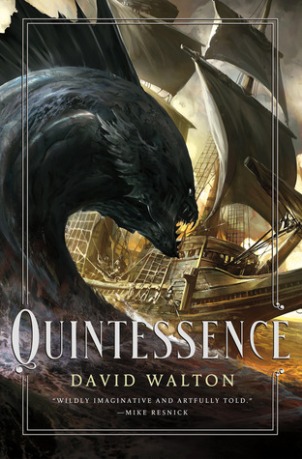Coverlust? Coverlust.
First, the horribly truncated summary: An alchemist and a mortician place their trust in a beetle and take a boat full of Protestants to the end of the world.
For once, I’m not being glib!
This book was provided to me via Netgalley in return for an honest review. I would like to thank Tor/Forge for giving me this opportunity and taking me seriously.
Now, as a fan of fantasy, Tor is a recognizable staple in our household. I hold them in very high acclaim and reverence. With that in mind, I am fully confident that the advance copy I received will be free of formatting errors by the time it goes on sale.
Why mention formatting errors at all? Those errors made the dialogue a chore to get through. Those errors, coupled with a mild start and a sluggish middle, made the book difficult. I was considering putting Quintessence into my unfinished pile and submitting my review thusly.
But, as I am a masochist, I trudged through. The final thirty percent of the book made it worthwhile.
However, that first seventy percent…
We start our story aboard the Western Star, where Lord Chelsey is returning to (Tudor) England with the last thirteen men from his crew. They’ve all been dying off during the return trip and the venture is nearly a failure. The only redemption he has are the barrels full of riches he has brought back. However, the barrels of gold and diamonds have turned into useless pebbles and the miracle water has turned into seawater.
Tough luck.
He’s deemed mad when the boat docks and dies shortly thereafter. The Western Star is condemned and sold off to the only man that knows its value: Christopher Sinclair, the court magician and part-time alchemist.
Before Sinclair can fully investigate the cargo of the ship, he realizes that someone is stealing away the sailor’s bodies. It’s none other than King Edward VI’s personal physician, Stephen Parris. Parris has taken a keen interest in the lack of decomposition and has decided to further his understanding by means of dissection.
Now, cutting up bodies might be all the rage in Venice, but they still frown upon the practice in Renaissance England. Parris has to hide his “ungodly” activities in order to remain respectable at court. His wife, understandably, doesn’t like walking in on rooms filled with human gore, so they’re marriage is held by a very thin thread.
(Funny note: most male characters are referred to by their last names (there are exceptions, especially where you have a father and son on the same boat). All female characters are referred to by their first names. Not sure if intentional style choice based on era or unintentional sexism.)
Well, in order to get funds for a return trip to Chelsey’s island, Sinclair sells Parris out to the sickly king and all the doctor’s money now belongs to the sea voyage. Parris’ wife is a survivalist, so she secures her fate and leaves her husband in the cold. She tries to secure her daughter’s fate as well, but their daughter “decides” (via otherworldly force) to go with her father to the edge of the world.
Oh, and the boat is full of refugee Protestants when they set sail. Why? Tudor England.
I am cutting many of the cool bits out (magic beetle) because explaining everything would exceed my character limit.
Wait a minute! We’re starting in one of my favorite historical periods, our protagonists are a magician/alchemist and a doctor (and the doctor’s daughter), and they’re sailing to the ends of the earth with a boat full of refugees in hopes of finding out the magic behind Chelsey’s voyage? What the hell is my problem? What was so wrong that I nearly put this book down in shame?
Well, I had no emotional connection to any of these characters until the end of the book. Even then, there was really only one character I connected with, and that was the doctor’s daughter, Catherine. The rest, while doing interesting things, were not interesting in and of themselves. Some, like Parris’ wife, came off as extremely annoying.
Also, there was a lot of setup required to pull off the conclusion. I’m used to setup (obviously, as a fantasy reader), but this setup was centered in characters doing scientific experiments during the journey. Instead of action, the characters repeatedly asked questions through interior monologue that, I think, the readers could have asked themselves without author prompting.
Add to that a very stilted dialogue where names were not placed with quotes and you’ve got a very tiring mess during your middle acts. Thankfully, we reestablish a clear antagonist by the end and I was actually pleased with the outcome.
I just wish I had a better middle to go with it. 3.5 stars.
